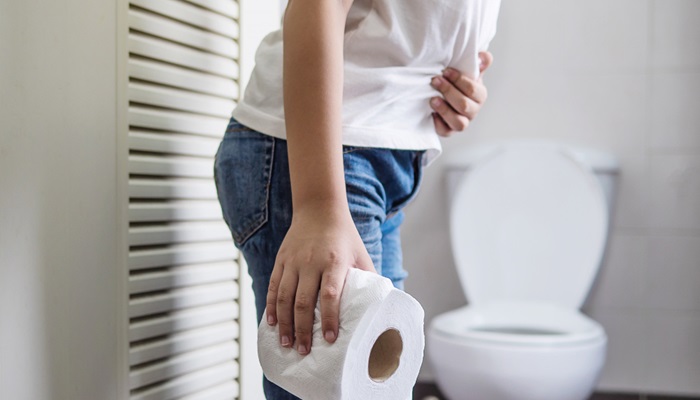Difficulty urinating can result from several medical conditions, such as an enlarged prostate or benign prostatic hyperplasia (BPH), infections, nervous system disorders, and nerve damage. If left untreated, this condition can cause discomfort and disrupt daily activities. Therefore, let’s take a look at the causes and treatment options for difficulty urinating.
Contents
Causes of Difficulty Urinating
Difficulty urinating occurs when you struggle to urinate, including difficulty starting urination and experiencing a weak or slow urine stream, sometimes only coming out drop by drop.
There are many causes of difficulty urinating, but benign prostatic hyperplasia (BPH) is the most common cause.
Here are some causes of difficulty urinating that you should be aware of:
1. Enlarged Prostate
An enlarged prostate or BPH is the most common cause of difficulty urinating. If you are a man, you have a prostate gland. This gland surrounds the urethra (the tube that carries urine from the bladder out of the body).
Many men experience benign prostate enlargement as they age. When the prostate enlarges in the middle section, it can put pressure on the urethra, making urination difficult.
2. Nervous System Disorders and Nerve Damage
Damaged nerves can disrupt urine flow and lead to difficulty urinating. Nerve damage can be triggered by several conditions, such as:
- Accidents
- Stroke
- Childbirth
- Diabetes
- Brain or spinal cord infections
Multiple sclerosis (MS) and other nervous system disorders can also cause nerve damage.
3. Surgery
Anesthesia (sedation) given during surgery can interfere with some of your nerves, leading to difficulty urinating afterward.
Surgeries involving the bladder, kidneys, or urethra can also create scar tissue that narrows the urethra, causing urination problems.
4. Infections
Infections, such as prostatitis, can also be a possible cause of difficulty urinating. Prostatitis is a common condition in men, characterized by inflammation of the prostate gland, which can lead to prostate swelling that compresses the urethra. As a result, urination becomes difficult.
Other infections that can cause difficulty urinating in both men and women include urinary tract infections (UTIs) and sexually transmitted infections (STIs).
5. Shy Bladder Syndrome (Paruresis)
In rare cases, difficulty urinating can be caused by shy bladder syndrome or paruresis. This psychological condition makes individuals feel uncomfortable urinating in the presence of others and may struggle to urinate in certain situations.
For example, someone with paruresis may hesitate to urinate when using public restrooms.
6. Consumption of Certain Medications
Taking certain medications can also lead to urination problems. For instance, medications for colds, nasal decongestants, and anti-allergy drugs can potentially affect urination.
Anticholinergic medications, which are commonly used to treat stomach cramps, muscle spasms, and incontinence, can also cause difficulty urinating. Additionally, antidepressant medications may influence urination habits.
Diagnosing Difficulty Urinating
Doctors can perform several tests to diagnose difficulty urinating. These tests help measure how much urine you pass, the strength and speed of your urine flow, and the pressure in your bladder.
Some diagnostic tests a doctor may conduct include:
- Imaging tests, such as ultrasound (USG) or CT scan, to assess how the bladder fills and empties, as well as to measure prostate size.
- Cystoscopy, a procedure that uses a special camera to examine the inside of the urethra and bladder.
- Urinalysis, a test that analyzes microscopic, visual, and chemical components of urine.
- Urine culture, which checks for signs of bacterial infections.
Treatment for Difficulty Urinating
The treatment plan recommended by a doctor for difficulty urinating depends on the underlying cause.
For example, if the condition is due to an enlarged prostate (BPH), the doctor may suggest REZUM Water Vapor Prostate Therapy. What Is REZUM Water Vapor Prostate Therapy?
REZUM Water Vapor Prostate Therapy is a minimally invasive, non-surgical treatment for BPH with long-term effectiveness. This therapy involves a specialized instrument that uses water vapor to shrink the enlarged prostate.
During this procedure, the doctor inserts a device through the urethra, eliminating the need for incisions. The area is numbed to reduce discomfort.
REZUM therapy is safe and effective for treating BPH, with long-lasting results.
Benefits of REZUM Therapy for BPH:
- No need for long-term BPH medications
- Many patients experience symptom improvement within weeks
- Preserves sexual function
- Patients can go home on the same day as the procedure
- No need for general anesthesia
- Quick recovery period
- Can be repeated if BPH symptoms return
For those experiencing difficulty urinating due to an enlarged prostate (BPH), you can visit Mandaya Royal Hospital Puri. We provide REZUM Water Vapor Prostate Therapy and have a team of specialist urologists ready to assist you.
1. dr. Hendy Mirza, Sp.U(K)

dr. Hendy Mirza, Sp.U(K), is a urology specialist who completed his medical education at the Faculty of Medicine, Universitas Sumatera Utara. He later pursued his urology specialist training at Universitas Indonesia and continued to advance his expertise through fellowship programs in Pediatric Urology Reconstruction and laparoscopy.
With his extensive training and clinical experience, dr. Hendy is qualified as a Pediatric Urology Consultant.
At Mandaya Royal Hospital Puri, dr. Hendy treats various urological conditions, including benign prostatic hyperplasia (BPH) using the modern Rezum therapy, a steam-based minimally invasive technique. In addition to Rezum, he also performs:
- Urinary tract surgeries
- Prostate biopsy
- PCNL (Percutaneous Nephrolithotomy)
- TURP (Transurethral Resection of the Prostate)
dr. Hendy Mirza, Sp.U(K) is available at Mandaya Royal Hospital Puri on:
- Monday: 16.00 – 19.00 WIB
- Wednesday: 16.00 – 19.00 WIB
- Friday: 16.00 – 19.00 WIB
2. dr. Maruto Harjanggi, BSc(Hons), Sp.U, FICS

dr. Maruto Harjanggi, BSc(Hons), Sp.U, FICS, is a urology specialist who graduated from the Faculty of Medicine, Universitas Indonesia. He also earned his Bachelor of Science (Honours) degree from the Faculty of Medical Sciences, Newcastle University, United Kingdom.
As a urology specialist with extensive experience, Dr. Maruto manages a wide range of urological procedures for both male and female patients. At Mandaya Royal Hospital Puri, he provides Rezum therapy, a modern steam-based treatment for benign prostatic hyperplasia (BPH). He is also skilled in performing:
- Kidney stone surgery
- Prostate disorder treatments
- Vasectomy
dr. Maruto Harjanggi, BSc(Hons), Sp.U, FICS is available at Mandaya Royal Hospital Puri on:
- Monday: 09.00 – 13.00 WIB
- Tuesday: 09.00 – 13.00 WIB
- Wednesday: 09.00 – 13.00 WIB
- Thursday: 09.00 – 13.00 WIB
- Friday: 09.00 – 13.00 WIB
- Saturday: 09.00 – 13.00 WIB
For Our International Patients

Mandaya Royal Hospital Puri is proud to welcome international patients seeking trusted, world-class medical services in Indonesia. With a team of highly trained specialists and consultants who are fluent in English, we prioritize clear communication and a smooth consultation process. Our mission is to deliver a comfortable, well-supported, and stress-free healthcare experience for every patient visiting from abroad—from arrival to the completion of treatment.
To enhance your overall comfort, our English-speaking Patient Experience Officers (PEO) are ready to guide you through every step of your visit, including appointment booking, registration, and navigation throughout the hospital. We also offer convenient pickup services from the airport or train station to make your travel seamless. For patients who need accommodations close to the hospital, Mandaya Royal Hospital Puri features an integrated hotel within the same complex, providing a safe, convenient, and worry-free stay during your treatment journey.
Experiences From Our Global Patients
Visit the Urology Center at Mandaya Royal Hospital Puri for more information on difficulty urinating. You can contact us via WhatsApp Chat, Book an Appointment, or download the Care Dokter app on Google Play and App Store.



